afterLoad (456.48KB) (658μs)
afterInitialise (1.28MB) (10.87ms)
afterRoute (856.95KB) (4.23ms)
beforeRenderComponent com_content (35.2KB) (298μs)
Before Access::preloadComponents (all components) (69.88KB) (571μs)
After Access::preloadComponents (all components) (98.07KB) (599μs)
Before Access::preloadPermissions (com_content) (1.6KB) (14μs)
After Access::preloadPermissions (com_content) (3.29MB) (4.94ms)
Before Access::getAssetRules (id:62 name:com_content.category.20) (130.65KB) (105μs)
After Access::getAssetRules (id:62 name:com_content.category.20) (7.38KB) (50μs)
Before Access::getAssetRules (id:8 name:com_content) (51.77KB) (10.66ms)
After Access::getAssetRules (id:8 name:com_content) (6.17KB) (26μs)
afterRenderComponent com_content (1.37MB) (57.49ms)
afterDispatch (32.63KB) (1.77ms)
beforeRenderRawModule mod_articles_category (READ MORE...) (350.71KB) (4.17ms)
afterRenderRawModule mod_articles_category (READ MORE...) (84.63KB) (37.06ms)
beforeRenderRawModule mod_tags_popular (Search) (4.81KB) (28μs)
afterRenderRawModule mod_tags_popular (Search) (6.61KB) (20.61ms)
beforeRenderRawModule mod_custom (BOOST YOUR IMMUNE DEFENSE) (960B) (26μs)
afterRenderRawModule mod_custom (BOOST YOUR IMMUNE DEFENSE) (4.2KB) (200μs)
beforeRenderRawModule mod_custom (Are you taking supplements) (736B) (13μs)
afterRenderRawModule mod_custom (Are you taking supplements) (1.03KB) (26μs)
beforeRenderRawModule mod_articles_category (Get additionel and more detailed knowledge about) (8.41KB) (20μs)
afterRenderRawModule mod_articles_category (Get additionel and more detailed knowledge about) (44.41KB) (2.55ms)
beforeRenderRawModule mod_custom (Antiaging) (6.97KB) (26μs)
afterRenderRawModule mod_custom (Antiaging) (1KB) (38μs)
beforeRenderRawModule mod_custom (Exercise) (720B) (11μs)
afterRenderRawModule mod_custom (Exercise) (1.02KB) (21μs)
beforeRenderRawModule mod_custom (Check this before you buy a Q10 product) (752B) (9μs)
afterRenderRawModule mod_custom (Check this before you buy a Q10 product) (944B) (19μs)
beforeRenderModule mod_articles_category (READ MORE...) (267.89KB) (2.66ms)
afterRenderModule mod_articles_category (READ MORE...) (1.25KB) (64μs)
beforeRenderModule mod_tags_popular (Search) (5.17KB) (15μs)
afterRenderModule mod_tags_popular (Search) (2.52KB) (26μs)
beforeRenderModule mod_custom (BOOST YOUR IMMUNE DEFENSE) (1.31KB) (12μs)
afterRenderModule mod_custom (BOOST YOUR IMMUNE DEFENSE) (1.28KB) (22μs)
beforeRenderModule mod_custom (Are you taking supplements) (352B) (10μs)
afterRenderModule mod_custom (Are you taking supplements) (1.28KB) (20μs)
beforeRenderModule mod_articles_category (Get additionel and more detailed knowledge about) (8.03KB) (17μs)
afterRenderModule mod_articles_category (Get additionel and more detailed knowledge about) (1.31KB) (20μs)
beforeRenderModule mod_custom (Antiaging) (7.33KB) (10μs)
afterRenderModule mod_custom (Antiaging) (1.27KB) (19μs)
beforeRenderModule mod_custom (Exercise) (336B) (9μs)
afterRenderModule mod_custom (Exercise) (1.25KB) (20μs)
beforeRenderModule mod_custom (Check this before you buy a Q10 product) (352B) (9μs)
afterRenderModule mod_custom (Check this before you buy a Q10 product) (1.28KB) (19μs)
beforeRenderRawModule mod_menu (Main menu-US) (28.53KB) (566μs)
afterRenderRawModule mod_menu (Main menu-US) (157.05KB) (1.36ms)
beforeRenderModule mod_menu (Main menu-US) (720B) (5μs)
afterRenderModule mod_menu (Main menu-US) (4.36KB) (52μs)
beforeRenderRawModule mod_languages (Sprogskift) (3.44KB) (16μs)
afterRenderRawModule mod_languages (Sprogskift) (29.88KB) (1.51ms)
beforeRenderModule mod_languages (Sprogskift) (720B) (5μs)
afterRenderModule mod_languages (Sprogskift) (5.31KB) (21μs)
beforeRenderRawModule mod_finder () (6.34KB) (11μs)
afterRenderRawModule mod_finder () (218.54KB) (1.95ms)
beforeRenderModule mod_finder () (704B) (5μs)
afterRenderModule mod_finder () (3.29KB) (32μs)
beforeRenderRawModule mod_custom () (6.62KB) (139μs)
afterRenderRawModule mod_custom () (26.52KB) (855μs)
beforeRenderModule mod_custom () (704B) (6μs)
afterRenderModule mod_custom () (1.23KB) (52μs)
beforeRenderRawModule mod_menu (Main menu-US) (5.07KB) (103μs)
afterRenderRawModule mod_menu (Main menu-US) (5.8KB) (670μs)
beforeRenderModule mod_menu (Main menu-US) (720B) (3μs)
afterRenderModule mod_menu (Main menu-US) (3.75KB) (43μs)
beforeRenderRawModule mod_languages (Sprogskift Mobil) (912B) (17μs)
afterRenderRawModule mod_languages (Sprogskift Mobil) (3.89KB) (630μs)
beforeRenderModule mod_languages (Sprogskift Mobil) (720B) (3μs)
afterRenderModule mod_languages (Sprogskift Mobil) (1.27KB) (29μs)
beforeRenderRawModule mod_finder () (2.3KB) (8μs)
afterRenderRawModule mod_finder () (6.29KB) (524μs)
beforeRenderModule mod_finder () (704B) (4μs)
afterRenderModule mod_finder () (1.23KB) (49μs)
beforeRenderRawModule mod_custom () (8.66KB) (175μs)
afterRenderRawModule mod_custom () (904B) (131μs)
beforeRenderModule mod_custom () (704B) (2μs)
afterRenderModule mod_custom () (2.43KB) (25μs)
beforeRenderRawModule mod_custom () (688B) (80μs)
afterRenderRawModule mod_custom () (896B) (107μs)
beforeRenderModule mod_custom () (704B) (2μs)
afterRenderModule mod_custom () (2.71KB) (22μs)
afterRender (184.7KB) (2.87ms)
| 1 x afterRenderComponent com_content (1.37MB) (33.29%) | 57.49ms |
| 1 x afterRenderRawModule mod_articles_category (READ MORE...) (84.63KB) (21.46%) | 37.06ms |
| 1 x afterRenderRawModule mod_tags_popular (Search) (6.61KB) (11.93%) | 20.61ms |
| 1 x afterInitialise (1.28MB) (6.3%) | 10.87ms |
| 1 x Before Access::getAssetRules (id:8 name:com_content) (51.77KB) (6.17%) | 10.66ms |
| 1 x After Access::preloadPermissions (com_content) (3.29MB) (2.86%) | 4.94ms |
| 1 x afterRoute (856.95KB) (2.45%) | 4.23ms |
| 1 x beforeRenderRawModule mod_articles_category (READ MORE...) (350.71KB) (2.41%) | 4.17ms |
| 1 x afterRender (184.7KB) (1.66%) | 2.87ms |
| 1 x beforeRenderModule mod_articles_category (READ MORE...) (267.89KB) (1.54%) | 2.66ms |
| 1 x afterRenderRawModule mod_articles_category (Get additionel and more detailed knowledge about) (44.41KB) (1.48%) | 2.55ms |
| 1 x afterRenderRawModule mod_finder () (218.54KB) (1.13%) | 1.95ms |
| 1 x afterDispatch (32.63KB) (1.03%) | 1.77ms |
| 1 x afterRenderRawModule mod_languages (Sprogskift) (29.88KB) (0.88%) | 1.51ms |
| 1 x afterRenderRawModule mod_menu (Main menu-US) (157.05KB) (0.79%) | 1.36ms |
| 1 x afterRenderRawModule mod_custom () (26.52KB) (0.49%) | 855μs |
| 1 x afterRenderRawModule mod_menu (Main menu-US) (5.8KB) (0.39%) | 670μs |
| 1 x afterLoad (456.48KB) (0.38%) | 658μs |
| 1 x afterRenderRawModule mod_languages (Sprogskift Mobil) (3.89KB) (0.36%) | 630μs |
| 1 x After Access::preloadComponents (all components) (98.07KB) (0.35%) | 599μs |
| 1 x Before Access::preloadComponents (all components) (69.88KB) (0.33%) | 571μs |
| 1 x beforeRenderRawModule mod_menu (Main menu-US) (28.53KB) (0.33%) | 566μs |
| 1 x afterRenderRawModule mod_finder () (6.29KB) (0.3%) | 524μs |
| 1 x beforeRenderComponent com_content (35.2KB) (0.17%) | 298μs |
| 1 x afterRenderRawModule mod_custom (BOOST YOUR IMMUNE DEFENSE) (4.2KB) (0.12%) | 200μs |
| 1 x beforeRenderRawModule mod_custom () (8.66KB) (0.1%) | 175μs |
| 1 x beforeRenderRawModule mod_custom () (6.62KB) (0.08%) | 139μs |
| 1 x afterRenderRawModule mod_custom () (904B) (0.08%) | 131μs |
| 1 x afterRenderRawModule mod_custom () (896B) (0.06%) | 107μs |
| 1 x Before Access::getAssetRules (id:62 name:com_content.category.20) (130.65KB) (0.06%) | 105μs |
| 1 x beforeRenderRawModule mod_menu (Main menu-US) (5.07KB) (0.06%) | 103μs |
| 1 x beforeRenderRawModule mod_custom () (688B) (0.05%) | 80μs |
| 1 x afterRenderModule mod_articles_category (READ MORE...) (1.25KB) (0.04%) | 64μs |
| 1 x afterRenderModule mod_menu (Main menu-US) (4.36KB) (0.03%) | 52μs |
| 1 x afterRenderModule mod_custom () (1.23KB) (0.03%) | 52μs |
| 1 x After Access::getAssetRules (id:62 name:com_content.category.20) (7.38KB) (0.03%) | 50μs |
| 1 x afterRenderModule mod_finder () (1.23KB) (0.03%) | 49μs |
| 1 x afterRenderModule mod_menu (Main menu-US) (3.75KB) (0.02%) | 43μs |
| 1 x afterRenderRawModule mod_custom (Antiaging) (1KB) (0.02%) | 38μs |
| 1 x afterRenderModule mod_finder () (3.29KB) (0.02%) | 32μs |
| 1 x afterRenderModule mod_languages (Sprogskift Mobil) (1.27KB) (0.02%) | 29μs |
| 1 x beforeRenderRawModule mod_tags_popular (Search) (4.81KB) (0.02%) | 28μs |
| 1 x After Access::getAssetRules (id:8 name:com_content) (6.17KB) (0.02%) | 26μs |
| 1 x beforeRenderRawModule mod_custom (BOOST YOUR IMMUNE DEFENSE) (960B) (0.02%) | 26μs |
| 1 x afterRenderRawModule mod_custom (Are you taking supplements) (1.03KB) (0.02%) | 26μs |
| 1 x beforeRenderRawModule mod_custom (Antiaging) (6.97KB) (0.02%) | 26μs |
| 1 x afterRenderModule mod_tags_popular (Search) (2.52KB) (0.02%) | 26μs |
| 1 x afterRenderModule mod_custom () (2.43KB) (0.01%) | 25μs |
| 1 x afterRenderModule mod_custom (BOOST YOUR IMMUNE DEFENSE) (1.28KB) (0.01%) | 22μs |
| 1 x afterRenderModule mod_custom () (2.71KB) (0.01%) | 22μs |
| 1 x afterRenderRawModule mod_custom (Exercise) (1.02KB) (0.01%) | 21μs |
| 1 x afterRenderModule mod_languages (Sprogskift) (5.31KB) (0.01%) | 21μs |
| 1 x beforeRenderRawModule mod_articles_category (Get additionel and more detailed knowledge about) (8.41KB) (0.01%) | 20μs |
| 1 x afterRenderModule mod_articles_category (Get additionel and more detailed knowledge about) (1.31KB) (0.01%) | 20μs |
| 1 x afterRenderModule mod_custom (Exercise) (1.25KB) (0.01%) | 20μs |
| 1 x afterRenderModule mod_custom (Are you taking supplements) (1.28KB) (0.01%) | 20μs |
| 1 x afterRenderRawModule mod_custom (Check this before you buy a Q10 product) (944B) (0.01%) | 19μs |
| 1 x afterRenderModule mod_custom (Antiaging) (1.27KB) (0.01%) | 19μs |
| 1 x afterRenderModule mod_custom (Check this before you buy a Q10 product) (1.28KB) (0.01%) | 19μs |
| 1 x beforeRenderModule mod_articles_category (Get additionel and more detailed knowledge about) (8.03KB) (0.01%) | 17μs |
| 1 x beforeRenderRawModule mod_languages (Sprogskift Mobil) (912B) (0.01%) | 17μs |
| 1 x beforeRenderRawModule mod_languages (Sprogskift) (3.44KB) (0.01%) | 16μs |
| 1 x beforeRenderModule mod_tags_popular (Search) (5.17KB) (0.01%) | 15μs |
| 1 x Before Access::preloadPermissions (com_content) (1.6KB) (0.01%) | 14μs |
| 1 x beforeRenderRawModule mod_custom (Are you taking supplements) (736B) (0.01%) | 13μs |
| 1 x beforeRenderModule mod_custom (BOOST YOUR IMMUNE DEFENSE) (1.31KB) (0.01%) | 12μs |
| 1 x beforeRenderRawModule mod_custom (Exercise) (720B) (0.01%) | 11μs |
| 1 x beforeRenderRawModule mod_finder () (6.34KB) (0.01%) | 11μs |
| 1 x beforeRenderModule mod_custom (Are you taking supplements) (352B) (0.01%) | 10μs |
| 1 x beforeRenderModule mod_custom (Antiaging) (7.33KB) (0.01%) | 10μs |
| 3 x beforeRenderModule mod_custom () (704B) (0.01%) | 10μs |
| 1 x beforeRenderModule mod_custom (Exercise) (336B) (0.01%) | 9μs |
| 1 x beforeRenderModule mod_custom (Check this before you buy a Q10 product) (352B) (0.01%) | 9μs |
| 2 x beforeRenderModule mod_finder () (704B) (0.01%) | 9μs |
| 1 x beforeRenderRawModule mod_custom (Check this before you buy a Q10 product) (752B) (0.01%) | 9μs |
| 2 x beforeRenderModule mod_menu (Main menu-US) (720B) (0%) | 8μs |
| 1 x beforeRenderRawModule mod_finder () (2.3KB) (0%) | 8μs |
| 1 x beforeRenderModule mod_languages (Sprogskift) (720B) (0%) | 5μs |
| 1 x beforeRenderModule mod_languages (Sprogskift Mobil) (720B) (0%) | 3μs |
 Sleep apnea affects our breathing during sleep. The condition is also known to impair the patient’s health and quality of life. It even appears that magnesium deficiency is a common problem in patients with sleep apnea and that adds to the risk of systemic inflammation, cardiovascular disease, and metabolic disorders, according to a new meta-analysis from Charles Sturt University in Australia. In this study, researchers demonstrate for the first time ever why patients with sleep apnea may need extra magnesium.
Sleep apnea affects our breathing during sleep. The condition is also known to impair the patient’s health and quality of life. It even appears that magnesium deficiency is a common problem in patients with sleep apnea and that adds to the risk of systemic inflammation, cardiovascular disease, and metabolic disorders, according to a new meta-analysis from Charles Sturt University in Australia. In this study, researchers demonstrate for the first time ever why patients with sleep apnea may need extra magnesium.







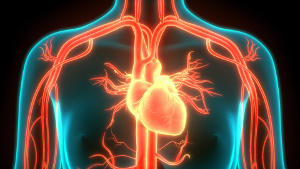 The diet’s content of vitamin K1 and vitamin K2 lowers the risk of atherosclerosis and cardiovascular disease by way of several mechanisms, yet there are relatively few studies that show the relation. In a Danish study that is published in Journal of the American Heart Association, scientists looked closer at how the content of the two forms vitamin K in the diet affect the risk of hospitalization linked to atherosclerosis and cardiovascular disease. So how does vitamin K counteract atherosclerosis and how much of the nutrient do we need?
The diet’s content of vitamin K1 and vitamin K2 lowers the risk of atherosclerosis and cardiovascular disease by way of several mechanisms, yet there are relatively few studies that show the relation. In a Danish study that is published in Journal of the American Heart Association, scientists looked closer at how the content of the two forms vitamin K in the diet affect the risk of hospitalization linked to atherosclerosis and cardiovascular disease. So how does vitamin K counteract atherosclerosis and how much of the nutrient do we need? Selenium is a trace element with a number of essential functions. An estimated one billion people worldwide get too little dietary selenium. The problem is mainly a result of nutrient-depleted farmland. Moreover, blood levels of selenium drop drastically in connection with COVID-19 infections, serious illness, and pregnancy because the body has an increased need for the nutrient. Altogether, selenium deficiency increases the risk of complicated COVID-19 infections, autoimmune diseases such as rheumatoid arthritis, Hashimoto’s thyroiditis, preterm delivery, and miscarriage. Supplementation may help optimize blood levels of selenium, which can be relevant for preventing and treating a number of common diseases, according to an article that is published in International Journal of Medical Sciences.
Selenium is a trace element with a number of essential functions. An estimated one billion people worldwide get too little dietary selenium. The problem is mainly a result of nutrient-depleted farmland. Moreover, blood levels of selenium drop drastically in connection with COVID-19 infections, serious illness, and pregnancy because the body has an increased need for the nutrient. Altogether, selenium deficiency increases the risk of complicated COVID-19 infections, autoimmune diseases such as rheumatoid arthritis, Hashimoto’s thyroiditis, preterm delivery, and miscarriage. Supplementation may help optimize blood levels of selenium, which can be relevant for preventing and treating a number of common diseases, according to an article that is published in International Journal of Medical Sciences.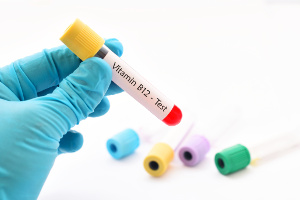 The number of seniors worldwide is increasing and more and more are affected by Alzheimer’s disease, the leading cause of dementia. We should therefore focus much more on this health problem that comes with an enormous human and socio-economic price tag. According to a new meta-analysis, supplementation with B vitamins appears to prevent or delay mild cognitive impairment in older people, which is normally an early sign of Alzheimer’s disease. In fact, supplementation with B vitamins may even represent an inexpensive therapy form with a huge potential.
The number of seniors worldwide is increasing and more and more are affected by Alzheimer’s disease, the leading cause of dementia. We should therefore focus much more on this health problem that comes with an enormous human and socio-economic price tag. According to a new meta-analysis, supplementation with B vitamins appears to prevent or delay mild cognitive impairment in older people, which is normally an early sign of Alzheimer’s disease. In fact, supplementation with B vitamins may even represent an inexpensive therapy form with a huge potential.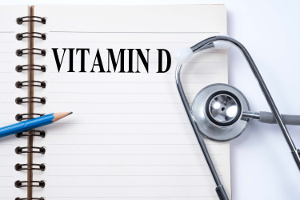 Vitamin D is essential for the immune defense. Because deficiencies of the nutrient are becoming increasingly common and vaccines only have limited effect, we can expect new waves of COVID-19 during the winter period. Vitamin D counteracts chronic inflammation which is seen in rheumatoid arthritis, diabetes, and other chronic diseases. Multiple studies have shown a link between low blood levels of vitamin D and the occurrence of these diseases. In a new meta-analysis that is published in Molecular and Cellular Biochemistry, scientists look closer at the scientific data for risk factors involved with vitamin D deficiencies and the advantages of taking vitamin D supplements in connection with COVID-19, rheumatoid arthritis, and other inflammatory diseases.
Vitamin D is essential for the immune defense. Because deficiencies of the nutrient are becoming increasingly common and vaccines only have limited effect, we can expect new waves of COVID-19 during the winter period. Vitamin D counteracts chronic inflammation which is seen in rheumatoid arthritis, diabetes, and other chronic diseases. Multiple studies have shown a link between low blood levels of vitamin D and the occurrence of these diseases. In a new meta-analysis that is published in Molecular and Cellular Biochemistry, scientists look closer at the scientific data for risk factors involved with vitamin D deficiencies and the advantages of taking vitamin D supplements in connection with COVID-19, rheumatoid arthritis, and other inflammatory diseases. It is commonly known that omega-3 fatty acids are involved in a number of essential functions in the body. One of the fatty acids, DHA, may even have a toxic effect on cancer cells because they are unable to store the fatty acid correctly. In a new Belgian study published in Cell Metabolism, scientists explain the exact mechanisms. They also suggest that omega-3 supplements may be useful in cancer therapy, especially because the average omega-3 intake from the diet is far too limited and because there is a risk of becoming resistant to medical cancer drugs. The new study puts omega-3 fatty acids and their anti-cancer effects in a whole new light.
It is commonly known that omega-3 fatty acids are involved in a number of essential functions in the body. One of the fatty acids, DHA, may even have a toxic effect on cancer cells because they are unable to store the fatty acid correctly. In a new Belgian study published in Cell Metabolism, scientists explain the exact mechanisms. They also suggest that omega-3 supplements may be useful in cancer therapy, especially because the average omega-3 intake from the diet is far too limited and because there is a risk of becoming resistant to medical cancer drugs. The new study puts omega-3 fatty acids and their anti-cancer effects in a whole new light.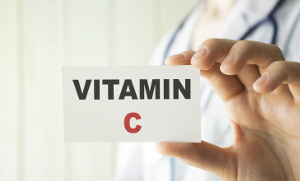 During World War II, food supplies were scarce. At one point, English researchers wanted to find out how little vitamin C it would take to prevent the potentially lethal disease, scurvy. In order to do that, they carried out a drastic experiment that later served as basis for our current vitamin C recommendations. However, a recent analysis of this old study has revealed that the actual need for vitamin C is a lot greater than previously thought, suggesting that WHO raise the recommended daily intake level. The question is how much vitamin C do we really need and what good does the vitamin do?
During World War II, food supplies were scarce. At one point, English researchers wanted to find out how little vitamin C it would take to prevent the potentially lethal disease, scurvy. In order to do that, they carried out a drastic experiment that later served as basis for our current vitamin C recommendations. However, a recent analysis of this old study has revealed that the actual need for vitamin C is a lot greater than previously thought, suggesting that WHO raise the recommended daily intake level. The question is how much vitamin C do we really need and what good does the vitamin do? Oily fish and fish oil have a high content of the two omega-3 fatty acids, EPA (eicosapentaenoic acid) and DHA (docosahexaenoic acid), that are important for our brain, nervous system, intelligence, and mental health. Modern diets, however, are to blame for our lack of omega-3. A team of scientists from England has found that supplementation with EPA-rich fish oil for 26 weeks improves mental acuity and reaction time in healthy, young adults. This was not the case with DHA-rich oil fish oil, on the other hand. The scientists were surprised to find that EPA is more important than DHA for these cognitive skills.
Oily fish and fish oil have a high content of the two omega-3 fatty acids, EPA (eicosapentaenoic acid) and DHA (docosahexaenoic acid), that are important for our brain, nervous system, intelligence, and mental health. Modern diets, however, are to blame for our lack of omega-3. A team of scientists from England has found that supplementation with EPA-rich fish oil for 26 weeks improves mental acuity and reaction time in healthy, young adults. This was not the case with DHA-rich oil fish oil, on the other hand. The scientists were surprised to find that EPA is more important than DHA for these cognitive skills.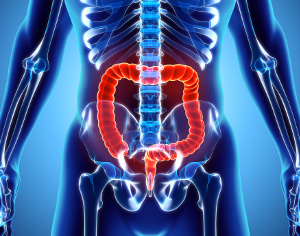 Colorectal cancer is one of the most common cancer forms in Denmark, which is why prevention is so important. According to a new American study that is published in Gastroenterology, increased intake of vitamin D appears to protect against bowel cancer, especially in people younger than 50 years. It even looks as if vitamin D may prevent intestinal polyps that can turn into cancer in some cases. The scientists say that higher intake of vitamin D may be relevant for prevention and may also serve as an inexpensive supplement to screening tests that are merely used for early diagnosis.
Colorectal cancer is one of the most common cancer forms in Denmark, which is why prevention is so important. According to a new American study that is published in Gastroenterology, increased intake of vitamin D appears to protect against bowel cancer, especially in people younger than 50 years. It even looks as if vitamin D may prevent intestinal polyps that can turn into cancer in some cases. The scientists say that higher intake of vitamin D may be relevant for prevention and may also serve as an inexpensive supplement to screening tests that are merely used for early diagnosis.